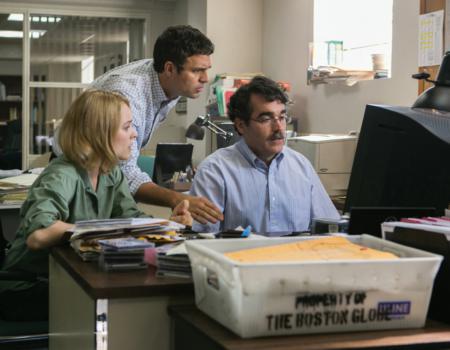Thinking about 'Spotlight'
'Spotlight,' the new feature-length film about The Boston Globe's coverage of the priest sex abuse scandal in the archdiocese that first hit the streets on Jan. 6, 2002, opened earlier in November to critical acclaim as one of the best movies of the year, and one of the best films of all time about the press. The Globe's reporting won a Pulitzer Prize and led to the resignation of Cardinal Bernard Law as Archbishop of Boston by the end of 2002, as well as deep reform in the way the Catholic Church handles such scandalous matters, not just here but around the world.
I share the general high regard for the movie and would urge all Catholics (at least those mature enough to understand: it's rated A-III for adults, and R for sexual language) to see it at some point. The sensational story of priests preying on youngsters and being quietly transferred to other parishes to do it again, all because of a culture of denial and the veil of secrecy with which such matters were handled by the clergy and hierarchy, without effective disciplinary measures, is a cautionary tale for institutions in general to put the protection of children first. The Church appears to have learned this lesson the hard (and incredibly expensive) way, but it is important for everyone, priests, laity, press and public, to be perhaps sadder but definitely wiser on the subject of sexual abuse. We are learning that such problems afflict other groups in society, like teachers and coaches.
To its credit, the film seems quite fair to the historical record, and strives for authenticity of place, personalities, and context, though admittedly some artistic license has come to light regarding minor characters. The sensational events are recollected in tranquility, rather than sensationalized in lurid detail. It is a very compelling, professional treatment of a story about professionalism and integrity in some of the press and a corresponding lack of professionalism and integrity (I would call it clericalism) in some churchmen.
One of the good things about 'Spotlight' is that the blame is spread around, not just to the hapless cardinal and woefully inadequate Church practices, but to others like diocesan and victims' attorneys who insisted on or agreed to secrecy clauses in settlement agreements, compliant police and prosecutors, and, yes, even to a media that wasn't paying much attention to what was happening. Intrepid reporters and courageous victims are properly recognized for their role in bringing about necessary reform.
Now that the dust has partially settled on this matter, what are we to make of the whole sordid affair, as believing Catholics who love our Church? One lesson is to be grateful for freedom of the press, together with the rule of law, which allowed the truth to come to light and justice to hopefully prevail in the end. It does seem to be the case that outside scrutiny was necessary in order to get the Church hierarchy to face up to its obligations of truth and charity towards victims and their families. Justice, rendering to everyone what is due them, should always be done and should be seen to be done. One-sided mercy to clerical perpetrators before justice is done and seen to be done is terribly misplaced compassion.
The other lesson is that there is really no substitute for holiness in our Church. In that regard, I would take issue with one fleeting impression that the film makes, which is that priestly celibacy is a root cause of the problem of sex abuse of minors. Of course, priestly sex abuse of any kind is a patent violation of priestly celibacy. The incidence of similar abuse in other denominations in which the religious ministers are married evidences the weak link between celibacy and unchastity.
What is needed is more, not less, holiness in the priesthood and among bishops, religious, and in every calling within the Church. Which is why I always say that we've got to try to come to the point where there are more cases of canonization in our Church than cases of priestly discipline or failed marriages. Sadly, there are always plenty of the latter.
Dwight G. Duncan is a professor of constitutional law at Umass School of Law Dartmouth.
- Dwight G. Duncan is professor at UMass School of Law Dartmouth. He holds degrees in both civil and canon law.



















